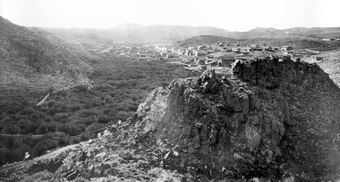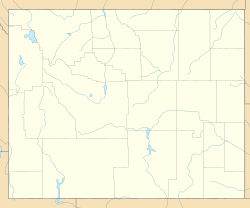South Pass City, Wyoming facts for kids
Quick facts for kids |
|
|
South Pass City
|
|

South Pass City in 1870, three years after gold was discovered
|
|
| Location | South Pass Rd., South Pass City, Fremont County, Wyoming |
|---|---|
| Built | 1867 |
| NRHP reference No. | 70000670 |
| Added to NRHP | February 26, 1970 |
South Pass City is a special place in Fremont County, Wyoming. It's not a city with a mayor and city council today, but it's a historic community. It sits about 2 miles south of where highways 28 and 131 meet.
This area was once a busy stop on the famous Oregon Trail. Later, it became a "ghost town" after its gold mines closed down. Today, the whole community is recognized as a historic site. It's listed on the National Register of Historic Places because of its important past. The closest town to South Pass City is Atlantic City.
Contents
The Story of South Pass City
South Pass City grew quickly in the 1850s. It was an important stop for stagecoaches and telegraph messages along the Oregon Trail. The very first settlement in this area was about 9 miles south of where South Pass City is now. This spot was called Burnt Ranch. It was where pioneers crossed the Sweetwater River for the last time before heading towards the South Pass.
A Famous Visitor: Mark Twain
In August 1861, a young man named Samuel Clemens traveled through South Pass City. He later became the famous writer Mark Twain. He wrote about his visit in his book, Roughing It, published in 1872.
Twain joked about how small South Pass City was back then. He said the hotel owner, postmaster, blacksmith, mayor, and police chief were all the same person! There were only about ten people living there. He found it funny that one person held so many important jobs in the tiny town.
Gold Rush and Women's Rights
A big change came in 1867 when gold was found nearby. A year later, people started digging for gold at what became the Carissa mine. Many prospectors and adventurers rushed to the area, and South Pass City was founded.
Within a year, the town's population grew to about 2,000 people! One important person was William H. Bright, a saloon owner. He was elected to the Wyoming Territorial Legislature. He helped pass a law that gave women the right to vote.
On December 10, 1869, Wyoming became the first place in the United States to let women vote. This happened long before women could vote in national elections in 1920!
The First Female Judge
In 1870, another amazing thing happened in South Pass City. Esther Hobart Morris became the first female justice of the peace (a type of judge) in the United States. She started her job on February 14, 1870, and served for almost nine months.
She was appointed after the previous judge quit. He was upset that Wyoming Territory had given women the right to vote. Esther Morris showed everyone that women could do important jobs in the community.
The Town Shrinks
Sadly, the large amounts of gold people hoped for didn't last. Within ten years, the town's population dropped a lot. By the mid-1870s, only about 100 people lived there. Even though it grew a little by 1901, the population kept falling over the next century.
Many of the old homes, stores, hotels, and saloons started to fall apart. The last of the original families moved out in 1949. South Pass City became a true ghost town.
South Pass City State Historic Site
Today, South Pass City is being brought back to life as a special historic site. It's a place where visitors can learn about its past. The community now has a few residents and the South Pass City State Historic Site.
This historic site protects more than 30 old buildings from the 1860s and 1870s. In 1970, the entire community was added to the National Register of Historic Places. This means it's recognized as an important part of American history.
The Carissa Mine
In 2003, the Wyoming State Legislature bought the Carissa Mine. This mine was the main reason South Pass City existed for many years. It was added to the State Historic Site.
Now, the mine buildings are safe and open for tours. You can even see demonstrations of how mining and milling equipment worked long ago. It's a great way to see what life was like during the gold rush!
Climate in South Pass City
| Climate data for South Pass City, Wyoming, 1991–2020 normals, 1900–2020 extremes: 7840ft (2390m) | |||||||||||||
|---|---|---|---|---|---|---|---|---|---|---|---|---|---|
| Month | Jan | Feb | Mar | Apr | May | Jun | Jul | Aug | Sep | Oct | Nov | Dec | Year |
| Record high °F (°C) | 60 (16) |
53 (12) |
68 (20) |
75 (24) |
83 (28) |
93 (34) |
98 (37) |
102 (39) |
87 (31) |
80 (27) |
65 (18) |
62 (17) |
102 (39) |
| Mean maximum °F (°C) | 42.8 (6.0) |
41.7 (5.4) |
52.1 (11.2) |
63.5 (17.5) |
73.5 (23.1) |
80.8 (27.1) |
85.9 (29.9) |
84.2 (29.0) |
78.9 (26.1) |
69.3 (20.7) |
51.6 (10.9) |
42.4 (5.8) |
80.4 (26.9) |
| Mean daily maximum °F (°C) | 28.0 (−2.2) |
29.2 (−1.6) |
38.3 (3.5) |
47.4 (8.6) |
58.5 (14.7) |
69.7 (20.9) |
77.6 (25.3) |
76.6 (24.8) |
67.2 (19.6) |
52.7 (11.5) |
37.2 (2.9) |
27.7 (−2.4) |
50.8 (10.5) |
| Daily mean °F (°C) | 15.2 (−9.3) |
16.7 (−8.5) |
25.3 (−3.7) |
33.4 (0.8) |
43.3 (6.3) |
52.2 (11.2) |
59.2 (15.1) |
57.5 (14.2) |
49.1 (9.5) |
37.6 (3.1) |
24.4 (−4.2) |
15.4 (−9.2) |
35.8 (2.1) |
| Mean daily minimum °F (°C) | 2.4 (−16.4) |
4.1 (−15.5) |
12.3 (−10.9) |
19.3 (−7.1) |
28.0 (−2.2) |
34.7 (1.5) |
40.8 (4.9) |
38.4 (3.6) |
31.0 (−0.6) |
22.6 (−5.2) |
11.7 (−11.3) |
3.0 (−16.1) |
20.7 (−6.3) |
| Mean minimum °F (°C) | −18.8 (−28.2) |
−20.7 (−29.3) |
−9.5 (−23.1) |
5.4 (−14.8) |
15.1 (−9.4) |
24.4 (−4.2) |
31.3 (−0.4) |
28.8 (−1.8) |
19.6 (−6.9) |
4.3 (−15.4) |
−12.9 (−24.9) |
−19.4 (−28.6) |
−22.0 (−30.0) |
| Record low °F (°C) | −45 (−43) |
−40 (−40) |
−33 (−36) |
−22 (−30) |
0 (−18) |
6 (−14) |
18 (−8) |
9 (−13) |
−5 (−21) |
−26 (−32) |
−30 (−34) |
−46 (−43) |
−46 (−43) |
| Average precipitation inches (mm) | 0.92 (23) |
0.62 (16) |
0.74 (19) |
1.34 (34) |
1.92 (49) |
1.33 (34) |
0.86 (22) |
0.95 (24) |
1.13 (29) |
0.98 (25) |
0.96 (24) |
0.89 (23) |
12.64 (322) |
| Average snowfall inches (cm) | 19.5 (50) |
19.0 (48) |
15.9 (40) |
19.3 (49) |
9.6 (24) |
0.7 (1.8) |
0.0 (0.0) |
0.0 (0.0) |
3.5 (8.9) |
12.1 (31) |
15.0 (38) |
21.5 (55) |
136.1 (345.7) |
| Source 1: NOAA (1981-2010 precipitation) | |||||||||||||
| Source 2: XMACIS2 (1991-2003 snowfall, records & monthly max/mins) | |||||||||||||
Images for kids
 | Jewel Prestage |
 | Ella Baker |
 | Fannie Lou Hamer |












